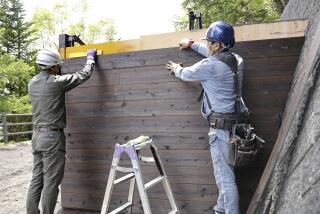Japan Plans to Build Monument as Alternative to Controversial Shrine
- Share via
TOKYO — Japan is planning to build a new monument to commemorate its war dead, a newspaper reported Saturday, in a move seen as an attempt to find an alternative to the controversial Yasukuni Shrine for officials paying homage.
Last week, Prime Minister Junichiro Koizumi sparked a diplomatic furor by visiting the Yasukuni Shrine, dedicated to Japan’s 2.46 million war dead.
The Yomiuri Shimbun newspaper said the government would begin discussing the details of a new cenotaph with a team of private advisors by the end of September.
A symbol of prewar Japanese nationalism, the Yasukuni Shrine, a Shinto shrine, became the focus of international attention in 1978 after the remains of 14 Class A war criminals were entombed at the site in a secret ceremony.
Bowing to pressure at home, Koizumi avoided visiting Yasukuni on Aug. 15--observed here as the anniversary of Japan’s World War II surrender--and went to it two days earlier instead, but he failed to mollify anger among Asian countries that suffered under Japan’s wartime aggression.
In the months leading up to Aug. 15, some politicians suggested building a separate monument.
Koizumi has said Japan needs to discuss the issue of paying tribute to its war dead without feeling discomfort.
Known for his nationalist tinge, Koizumi argues that war criminals have already been punished and that after death there was no need to distinguish between those who died in battle and those executed for war crimes.
Analysts say his visit to Yasukuni was also aimed at winning the support of a group representing war veterans, a powerful support base for his Liberal Democratic Party.
Koizumi was the first prime minister since 1985 to visit the shrine in mid-August. Yasuhiro Nakasone visited in August of that year but was denounced so widely that he canceled a return the following year. Kiichi Miyazawa paid a quiet visit in fall 1992, and Ryutaro Hashimoto came on his birthday in July 1996 but insisted that he did so as a private citizen.
Outrage caused by Koizumi’s visit has yet to ebb in South Korea and China, two major victims of Japan’s aggression.
More to Read
Sign up for Essential California
The most important California stories and recommendations in your inbox every morning.
You may occasionally receive promotional content from the Los Angeles Times.













